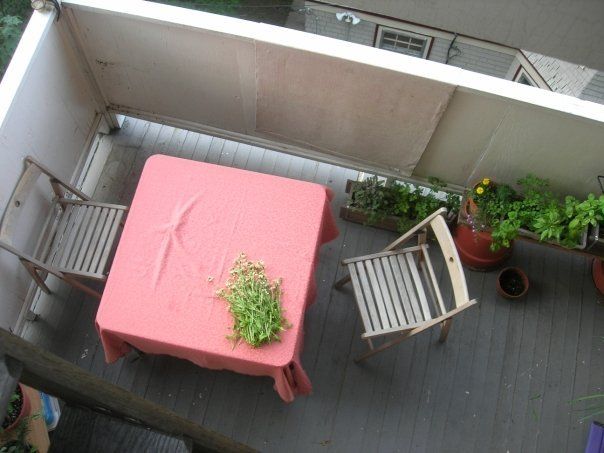Right before the first frost hit last weekend, I went out to
my tiny porch and "harvested" all of the herbs I'd been growing in
window boxes.
I've been growing things on porches and roofs since I first moved to Boston in 2008, and while it's been fun to have little sprigs to garnish salads, I'm finding more and more that I'm craving real earth to plant in. I'm thinking this is the decade for that - even though Mark and I haven't even started looking at land let alone places with just a postage stamp of earth to call our own, I've already begun making lists of things that I will plant—not only for salads, tinctures and soups but also for the Curio storeroom. Working with plants is the best meditation: I find it cools my brain and anxious nerves in a way that yoga, Jim Croce and whiskey cannot.
 |
| my porch in Jamaica Plain, circa 2009 |
But, speaking of liquor, I had some vodka and realized it
was the perfect way to preserve all these herbs I'd just picked. While I have made
true tinctures in the past (essentially an herbal extraction used for medicinal
purposes, such as elderberry tincture to ward off colds), in this case I wanted
to make a delicious herbal liquor, such as one of my favorites made by monks in
the south of France.
Green Chartreuse is made from 130 different botanicals. I
can't even name that many if you locked me in a room for 8 hours with a pencil
(actually, I haven't tried it so I don't know). Two monks execute the
distillation process: Dom Benoit and Brother Jean-Jacques. They use a recipe
passed down over 400 years from an old manuscript. According to the Internet,
18 tons of botanicals are used per year to make Chartreuse. The original
recipe, called "The Elixir of Long Life" believed to be made by a
16th century herbalist, was meant first as a sort of medicine, not dissimilar
from the tinctures that modern herbalists make today, but because this elixir
was so delicious it soon became known as a drink more than a medicine (it also
evolved to be lower in alcohol content).
While I like to think that I was infusing my herbs in vodka
for medicinal purposes, I was mainly excited to put my herbs into a drink I
could share with friends in dark and cool evenings to come - a chloraphylled
memory of summer that might shimmer with warmth and the remnants of fragrant
gardens.
I managed to find 1/10th as many botanicals (about 14) to
put into my homemade Chartreuse, which I believe is a noble first effort. While
I didn't have any angelica on hand - one of the supposed herbs included in
Chartreuse - I had some other fun ingredients, including tarragon which gives it that distinctive French flavor. Here's what I put in:
tarragon, basil, rose geranium, bay leaf, fennel seed, Cubeb pepper, coriander, lemon verbena, Meyer lemon peel, thyme flowers, fresh dill, orange blossom, holy basil and parsley.I let it infuse for 48 hours before straining it, as I didn't want the herbs to start darkening the liquid too much, but I wanted enough time for the essential oils and botanical nutrients to be extracted from all the plant material, including the spices. The resulting flavor was surprisingly good - definitely herbal, slightly bitter with sweet notes of anise, citrus and a floral aroma. While obviously different from the true liquor, I am proud with the results and I look forward to sipping it into the winter months.
If you're not up for making your own infusion at home, I highly recommend asking for a taste of Chartreuse at your local watering hole. And if you love it, invest in a bottle that will bring you cheer for years to come. Here's a recipe to try.
Tailspin
Mark and I received this recipe the first evening of our honeymoon at a hotel bar in New York City. For this recipe it's recommended to use a less juniper-forward gin, such as Plymouth.
dash Campari
1 oz sweet vermouth
1 oz green Chartreuse
1 oz gin
Add to a mixing glass full of ice, stir for 1-2 minutes and strain into a chilled cocktail glass. Garnish with a lemon peel.









While reading the article, I could envision the writer sitting alone thinking. I can tell that you worked very hard on this article. Thank you. This page shows you usage and meanings of elixir definition around the world.
ReplyDeleteIf you like the refreshment of aromatic fragrance then you can consume herbal incense. Because herbal incense is well known for its aromatic fragrance. Further, herbal incense also provides the most unique feelings than other fragrances.
ReplyDeleteI can only aspire to write material like this. I am extremely impressed with your presentation of the sound points in this article. Thank you for writing this engaging content. A tincture with more than one base; a compound tincture ormedicine, composed of various substances, held in solution by alcoholin some form.This page shows you usage and meanings of elixir around the world.
ReplyDelete